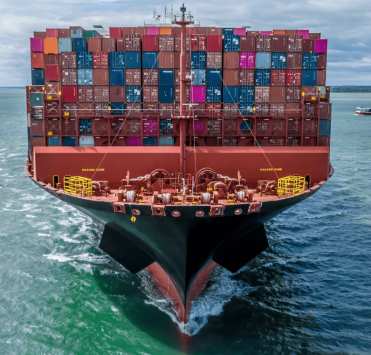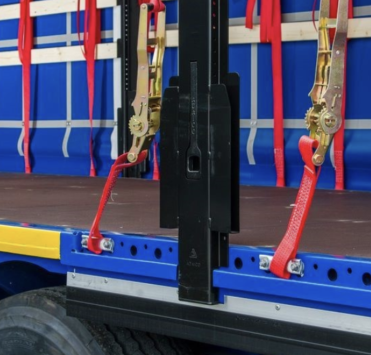Trends in container transportation to Ukraine: what goods are imported most often?

For many years, container transportation to Ukraine has been one of the most reliable and cost-effective ways to deliver goods from different countries. The high versatility of container logistics makes it possible to import a wide variety of goods: from clothing and electronics to complex industrial equipment.
Advantages of container transportation to Ukraine
- Reliability and protection of cargo
- The container protects goods from external influences, weather conditions, theft and other risks.
- Sealing the container provides additional control and security during delivery.
- Convenient multimodal logistics
- A container can be easily transferred from a ship to a train or truck without additional transshipment.
- Due to multimodal transportation, delivery times are reduced and logistics costs are reduced.
- Flexible shipment volumes (FCL and LCL)
- FCL (Full Container Load) is a full container for large shipments.
- LCL (Less than Container Load) - groupage cargo, where one container is shared by several shippers.
- Cost optimization
- The more goods are sent in one container, the lower the cost of delivery per unit of goods.
- Competent cargo consolidation helps importers save on logistics, especially in the case of regular deliveries.
Popular categories of goods transported by containers
1. Clothing, footwear and textiles
- The main exporters are: China, Turkey, Poland, Italy, Germany.
- Logistics features: High turnover and seasonal collections require regular deliveries. Container transportation from China remains one of the most popular destinations.
- Customs and certification: Mandatory labeling and conformity assessment of goods (especially when importing children's clothing).
2. Electronics and household appliances
- Main exporters: China, South Korea, Japan, European countries.
- The range of products: Smartphones, laptops, televisions, home appliances (refrigerators, washing machines, multicookers).
- Special requirements: Careful packaging and protection against vibrations during transportation, as well as additional safety measures against temperature and humidity changes.
3. Food and beverages
- Main exporters: Turkey (fruits and vegetables), EU countries (canned food, delicacies, wine), USA (nuts, sauces), Asia (tea, spices).
- Types of containers: Refrigerated containers for perishable and frozen products are used.
- Customs nuances: Quality certification, veterinary and sanitary documents, strict control of expiration dates.
4. Building materials and chemical products
- Assortment: Cement, dry mixes, paints and varnishes, fertilizers, polymer raw materials.
- Main exporters: China, Turkey, Eastern European countries.
- Special features: The use of specialized containers (FlexiTank for liquid products, Big Bag for bulk materials), compliance with storage rules.
5. Machinery and equipment
- Range: Industrial and agricultural equipment, machine tools, generators, engines, pumps.
- Main exporters: China, Germany, Italy, Poland.
- Special measures: Mandatory insurance of expensive equipment, high-quality packaging to protect against damage.
6. Auto parts and components
- Main exporters: China, Japan, South Korea, EU countries.
- The range of products: Tires, spare parts for cars and trucks, lubricants, batteries.
- Customs requirements: Confirmation of compliance with standards, availability of safety certificates.
7. Furniture and interior items
- Range of products: Cabinet and upholstered furniture, office furniture, decorative goods.
- Main exporters: China, Turkey, Poland, Italy.
- Special features: Large volume and dimensions require rational loading of the container to avoid damage during transportation.
Import trends and logistics in Ukraine
- Growth of e-commerce
- Online retailers are increasing their sales by ordering clothing, footwear, electronics, and accessories in large quantities.
- Container transportation allows for a regular flow of new goods to the warehouse.
- Multimodal schemes and shorter lead times
- A combination of sea, rail and road transport provides flexibility in choosing routes.
- Speed up customs procedures through electronic pre-declaration systems.
- Digitalization and online cargo control
- Logistics operators offer online offices with the ability to track the container's path in real time.
- Electronic document management reduces the time for clearance and eliminates many errors.
- Stricter environmental standards
- More and more attention is being paid to environmental standards in the production of packaging.
- The use of environmentally friendly materials and optimization of cargo flows to reduce the carbon footprint.
- Development of warehouse infrastructure
- Modern logistics complexes are emerging around major ports (Odesa, Chornomorsk) and cities with a population of over one million (Kyiv, Lviv, Dnipro).
- It is possible to consolidate cargo from different regions for further distribution.
How to choose a reliable container cargo carrier?
- Work experience and reputation
- Study reviews and cases to understand the company's real experience in container transportation.
- Make sure that the logistics operator works with your target exporting countries.
- Developed partner network
- The presence of trusted agents in major ports and logistics hubs around the world.
- This greatly simplifies the process of cargo consolidation and shortens delivery times.
- Insurance and additional services
- The availability of cargo insurance will protect against financial losses in case of force majeure.
- Check whether the company provides turnkey warehousing, consolidation, and labeling services.
- Transparency of payments
- The carrier must clearly indicate all costs: freight, port fees, customs duties, insurance, and other logistics costs.
- Avoid situations where the total cost of delivery changes significantly during the transportation process.
Practical tips and conclusion
Container transportation to Ukraine is the most convenient and reliable way to deliver a wide range of goods: from clothing and footwear to building materials and industrial equipment. The growth of e-commerce, the development of warehouse infrastructure and the digitalization of logistics processes make container logistics particularly attractive to Ukrainian importers. It is important to:
- Carefully plan the route and choose the optimal type of container (FCL or LCL).
- Comply with the requirements of customs legislation and prepare all permits in advance.
- Choose a reliable carrier capable of providing a full range of services (consolidation, insurance, multimodal delivery).
By following these recommendations, you will be able to reduce logistics costs, speed up delivery times, and provide your customers or partners with a stable supply of quality goods from abroad.
If you are looking for an experienced partner to organize container transportation to Ukraine, don't hesitate to contact us! We will help you:
- Calculate the cost of delivery and choose the best route;
- Organize customs clearance and certification;
- Provide warehouse services and cargo consolidation.
Contact us in any convenient way to get advice or order a cost calculation right now.









